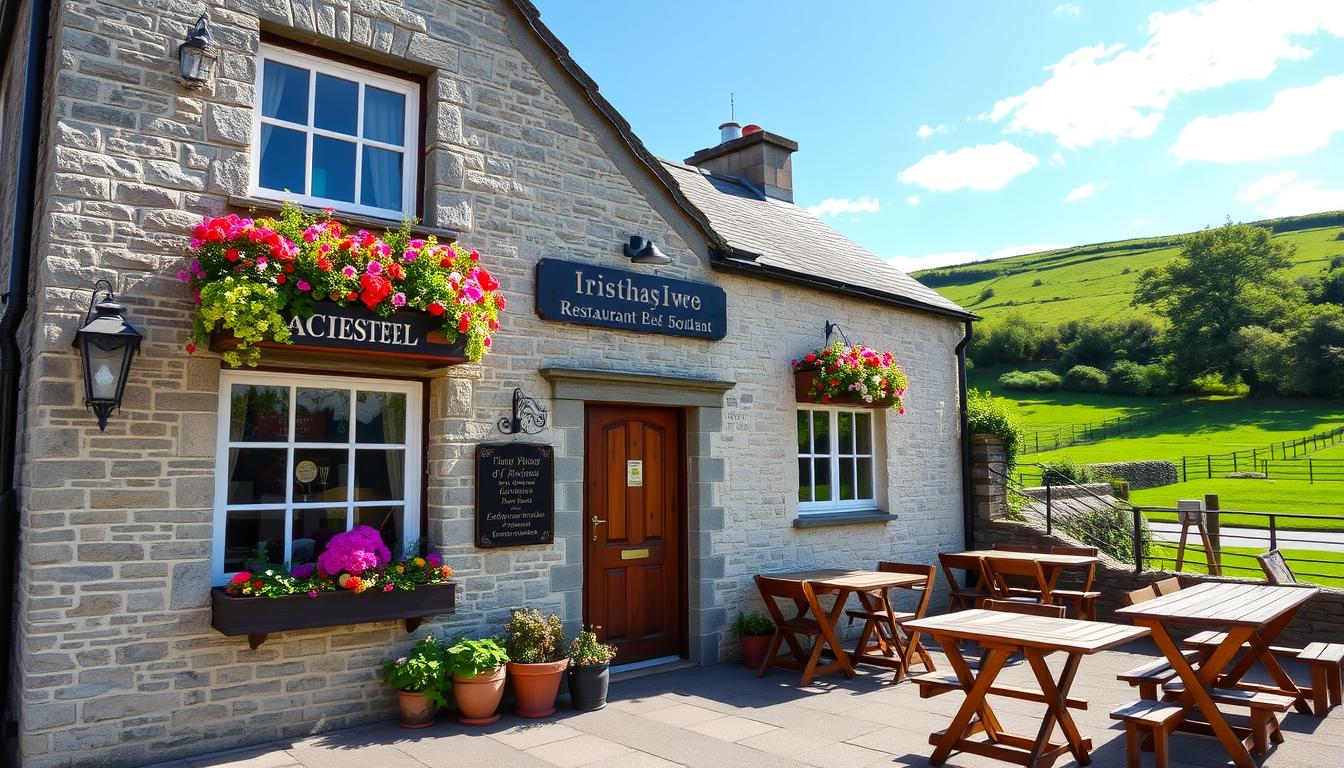Opening a restaurant in Ireland is both exciting and challenging. The country’s food scene is growing fast. This means there are many chances to succeed in the Irish restaurant business.
To make it happen, you need to plan well and use the right strategies. We’ll cover key points to think about. This includes knowing the market and using local resources like the Restaurants Association of Ireland. Follow these tips to build a solid base for your restaurant in Ireland.
Understanding the Restaurant Market in Ireland
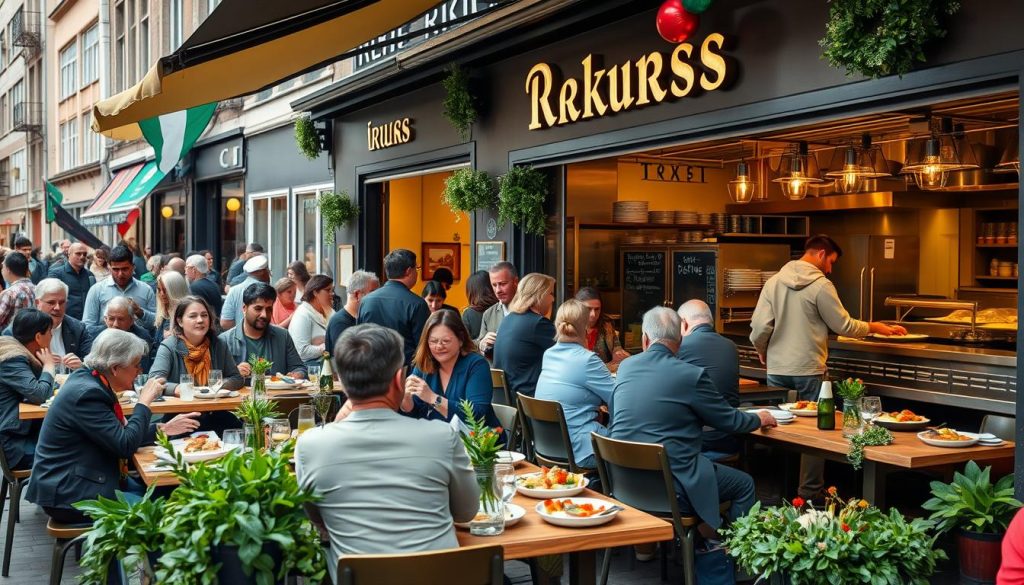
Getting to know the Irish restaurant market is key for success. Trends show a lively scene, driven by changing tastes and social changes. People are now more interested in eating sustainably, showing a growing concern for the planet.
There’s also a big rise in demand for vegetarian and vegan food. More people want healthy, plant-based meals. This has led restaurants to update their menus. Data from Bord Bia shows that diners value places that use local ingredients, boosting the appeal of eco-friendly eateries.
Online reviews play a big role too. Many check out digital platforms before choosing where to eat. Having a strong online presence is crucial for success in Ireland’s lively food scene. Knowing these trends helps new businesses find their place in the vibrant dining culture of Ireland.
Researching Your Target Audience

Finding out who your restaurant’s target audience is is key to success. Doing deep market research helps you understand your potential customers. This includes knowing their age, income, lifestyle, and what they like to eat.
There are many ways to do market research:
- Surveys: Online or paper surveys can give you direct feedback from people about what they want and like.
- Focus Groups: Talking to a small group of people can give you deeper insights into their eating habits and preferences.
- Social Media Analysis: Watching comments and trends on Twitter and Instagram can show you what’s popular and what people think.
By understanding this data, restaurant owners can make their offerings match what their target market wants. Whether it’s locals wanting comfort food, tourists after authentic experiences, or certain age groups looking for unique dining, research is crucial.
Tips for Opening a Restaurant in Ireland
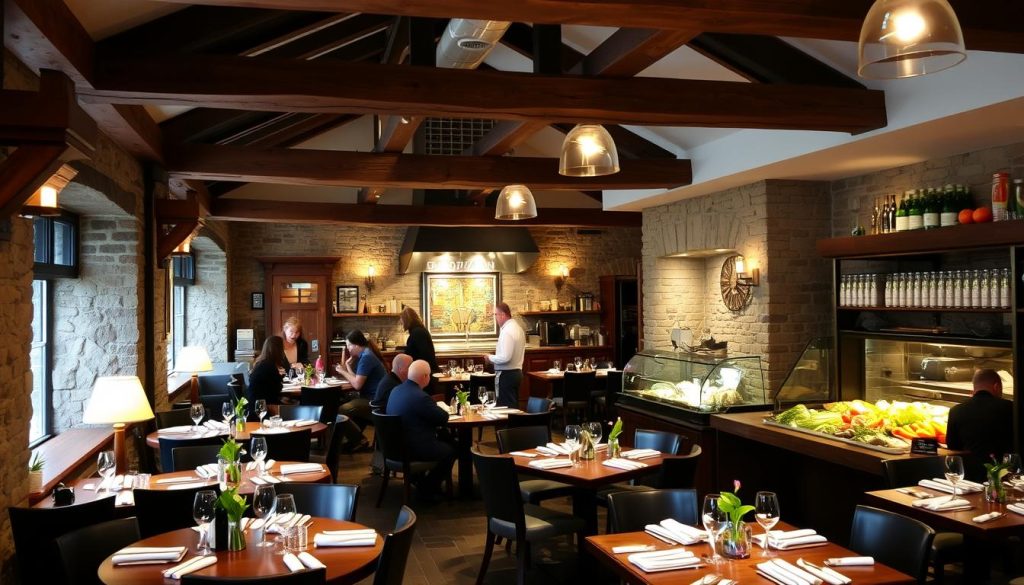
Opening a restaurant is both thrilling and tough. For those in Ireland, there are many tips for restaurant owners to succeed. Good planning is key; it lays the groundwork for success.
Knowing your competition is vital. Market research helps spot what makes your place special. This way, you can attract and keep customers.
Testing your concept is smart. Try out menu items and ask for feedback. This helps you make changes and meet customer needs.
Creating a strong brand is crucial for lasting business success in Ireland. A unique identity and clear message can set you apart. Your brand should show what your restaurant stands for, building loyalty.
It’s important to know the culinary rules. Health and safety standards are not just rules; they reassure customers about your food and service.
Getting involved in the community is key. Join local events and support nearby businesses. This boosts your visibility and connects you to the area.
Always keep learning. Stay up-to-date with trends, customer likes, and new tech. This keeps you flexible and ready for the hospitality world.
Creating a Solid Business Plan
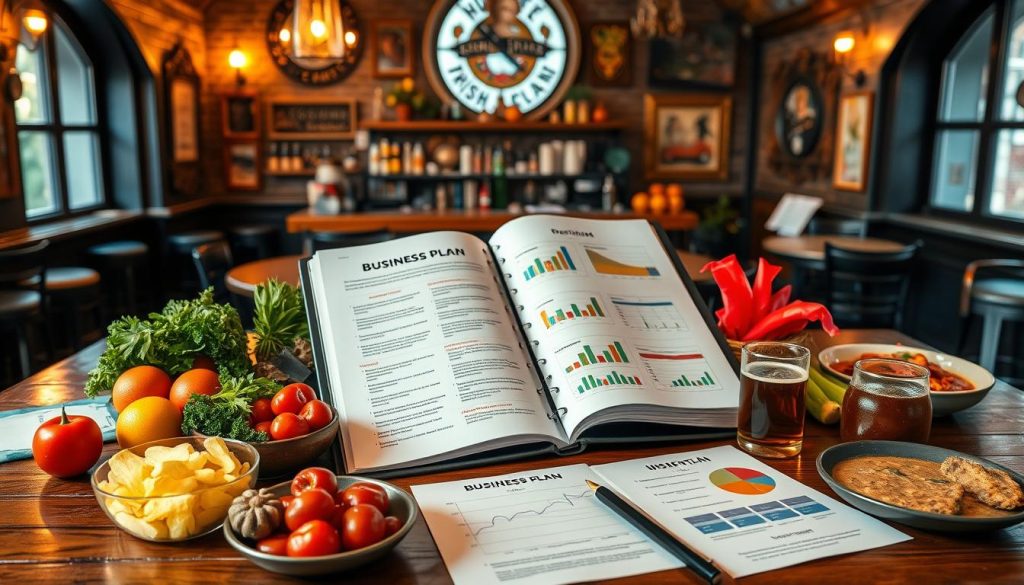
A good business plan is like a map for your restaurant journey. It outlines your goals and how you’ll achieve them. A unique theme can make your restaurant stand out, attracting the right customers.
Defining Your Restaurant Concept
Starting with your restaurant concept is key. Think about what food you’ll serve, how you’ll serve it, and the vibe you want. Look at successful restaurants in Ireland for inspiration. Ask yourself:
- What kind of food will you serve?
- Will it be casual or fancy?
- How will you show off local culture?
These questions help shape your concept. They’re the heart of your restaurant, affecting how customers feel.
Financial Projections and Funding
Getting the financial side right is essential. You need to know your startup costs, expected earnings, and profit margins. This includes all the expenses, like rent, equipment, and initial stock.
Finding the right funding is also crucial. Here are some options:
- Bank loans offer big sums of money.
- Investors can back your dream for a share of your business.
- Government grants help small businesses and food projects.
Knowing these funding options helps you get the money you need to open your restaurant.
Choosing the Right Location

Finding the perfect spot for your restaurant is key to success. A good location strategy can boost footfall and make your brand more visible. This part looks at important factors to consider when picking a site, based on expert advice and successful stories.
Factors to Consider for Locational Success
When looking at potential sites, think about these points:
- Foot Traffic: Lots of people walking by can help your restaurant get noticed and attract more customers.
- Visibility: A spot that’s easy to see can help your brand stand out and attract more people.
- Competition: Knowing what’s around can help you find a unique spot for your restaurant.
- Accessibility: Make sure your site is easy to get to by different ways of transport, for a wide range of customers.
- Demographics: Check the area’s people to make sure your food and vibe match what they like.
Registering Your Business and Legal Requirements

Starting a restaurant in Ireland means following many steps. It’s key to know the legal rules to avoid problems. First, you need to pick a business type, like being a sole trader or a limited company.
After choosing your business type, getting the right licences is crucial. You might need:
- Restaurant permit
- Alcohol licence (if serving alcoholic beverages)
- Food safety management system
Don’t forget about food hygiene and safety rules. Knowing these laws keeps everyone safe. Registering with the local health authority can help you meet these standards.
Also, using government resources is a good idea. They offer help with legal rules for restaurants. Local offices and online sites can guide you through the process.
Designing an Inviting Restaurant Environment
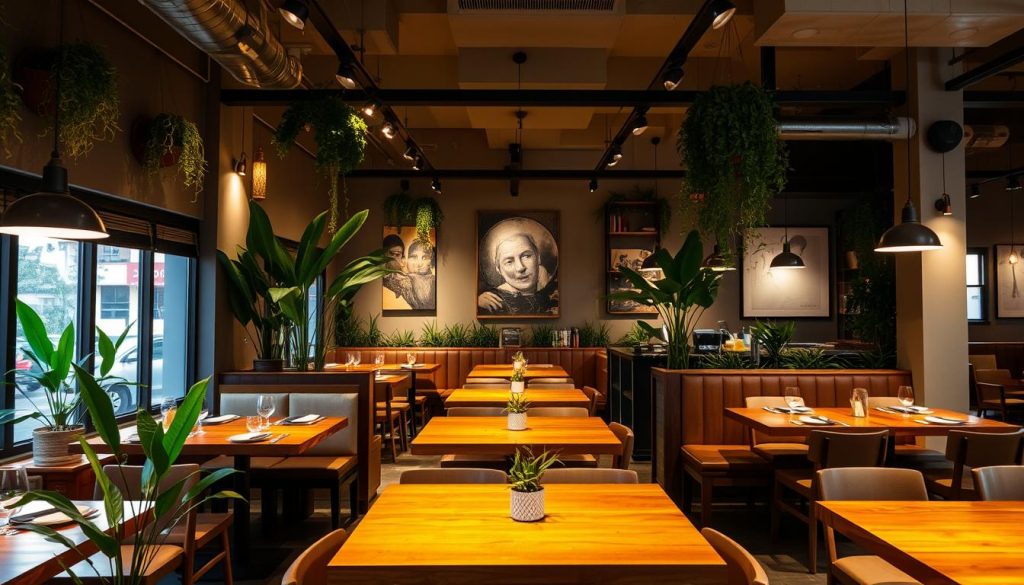
A restaurant’s design is key to a great customer experience. It’s not just about looks; it sets the mood for guests. Things like colours, furniture, lighting, and layout all matter a lot. They help shape how people feel in the space.
Thinking about these details helps owners make a welcoming place. It should match their restaurant’s idea.
Interior Design Elements
When designing a restaurant, focus on these important parts:
- Colour Schemes: Pick colours that fit the theme and mood you want.
- Furniture Selection: Choose furniture that’s comfy and stylish, showing off your brand.
- Lighting: Use different lights to change the mood in the space.
- Layout: A good layout helps guests move easily and enjoy their meal more.
Creating an Outdoor Space
Outdoor dining areas can make dining better, especially when it’s nice outside. Good patio design mixes comfort and style. Here are tips for a great outdoor area:
- Weather Considerations: Add covers and heaters for use all year.
- Customer Comfort: Pick seats that are comfy and good for chatting.
- Aesthetic Appeal: Add plants and nice decor for a calm feel.
Curating Your Menu
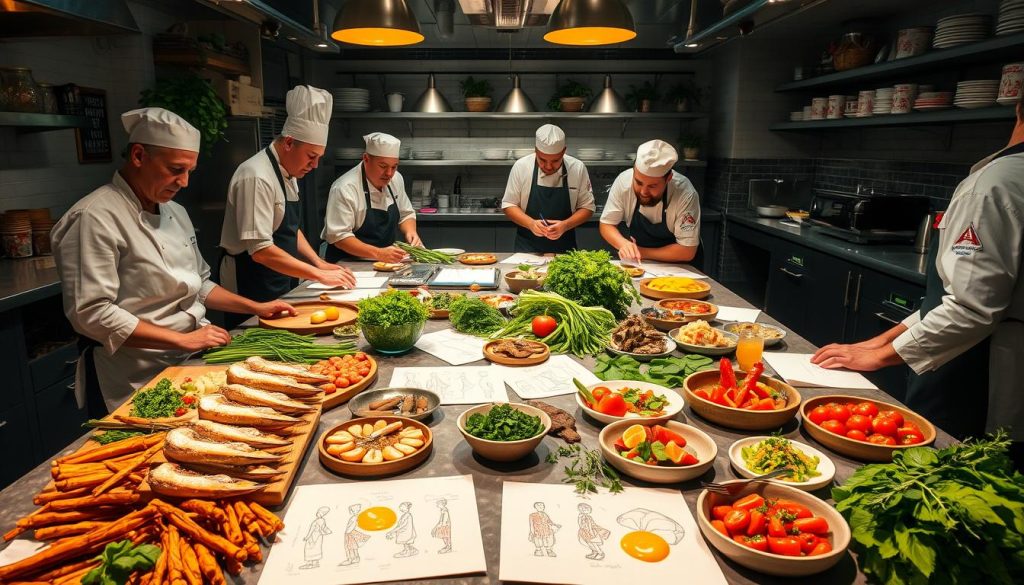
Creating a great menu is key to a restaurant’s success. Chefs and managers can make dishes that appeal to their audience and stay true to their vision. They must think about pricing, local ingredients, and the true spirit of Irish cuisine.
Pricing Strategies
Setting the right prices is vital for quality and profit. It’s important to research menu costs and compare with competitors. Here are some strategies:
- Offer a variety of prices to attract different customers.
- Use cost-plus pricing to cover all costs and make a profit.
- Look at what competitors charge to find the right spot in the market.
Incorporating Local Ingredients
Using local ingredients makes dishes more appealing and supports the community. It’s good for the environment and health-conscious diners. The benefits include:
- Food tastes better and is fresher, making meals more enjoyable.
- It helps build strong ties with local farmers and suppliers.
- It lets menus change with the seasons, offering something new.
By adding local flavours, restaurants can stand out. They show respect for Irish cuisine while meeting today’s diner’s tastes.
Hiring the Right Staff
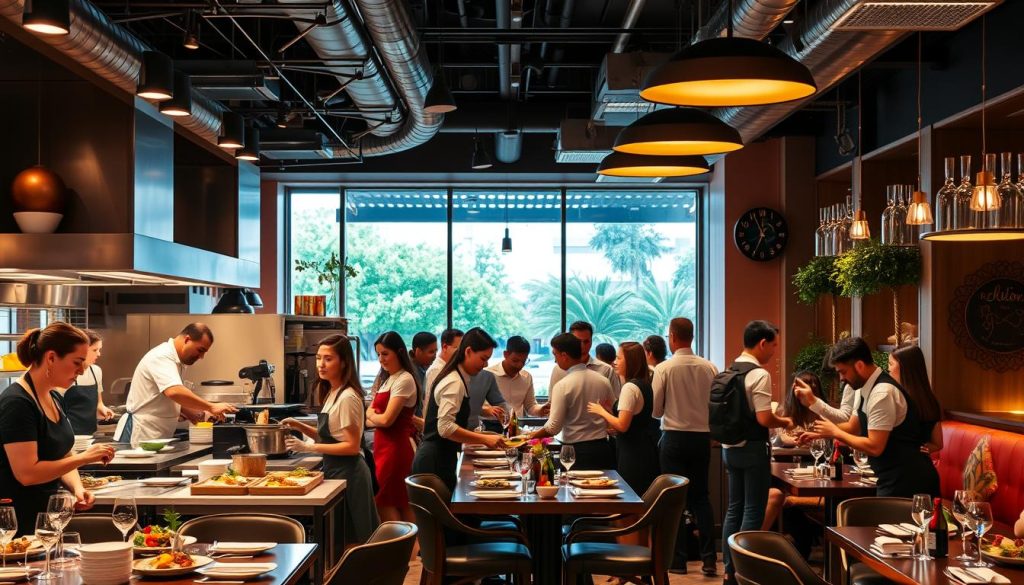
The success of a restaurant depends a lot on its team. It’s not just about filling jobs; it’s about finding the right people. Knowing what each job entails is key to a smooth operation.
Defining Roles and Responsibilities
Understanding each job and its duties is crucial for success. Here are some common roles in restaurants:
- Front of House Staff: Hosts, servers, and bartenders make sure customers are happy and welcome.
- Kitchen Staff: Chefs, sous chefs, and assistants prepare food, keeping quality and safety high.
- Management: Managers run the show, overseeing everyone, managing schedules, and solving problems.
- Cleaning Crew: They keep the place clean, which is vital for health and safety.
Choosing the right staff for these roles improves teamwork and efficiency. Good leadership creates a positive work atmosphere. This helps keep staff happy and reduces turnover. Regular training also boosts performance, making everyone feel important and valued.
Marketing Your Restaurant Effectively
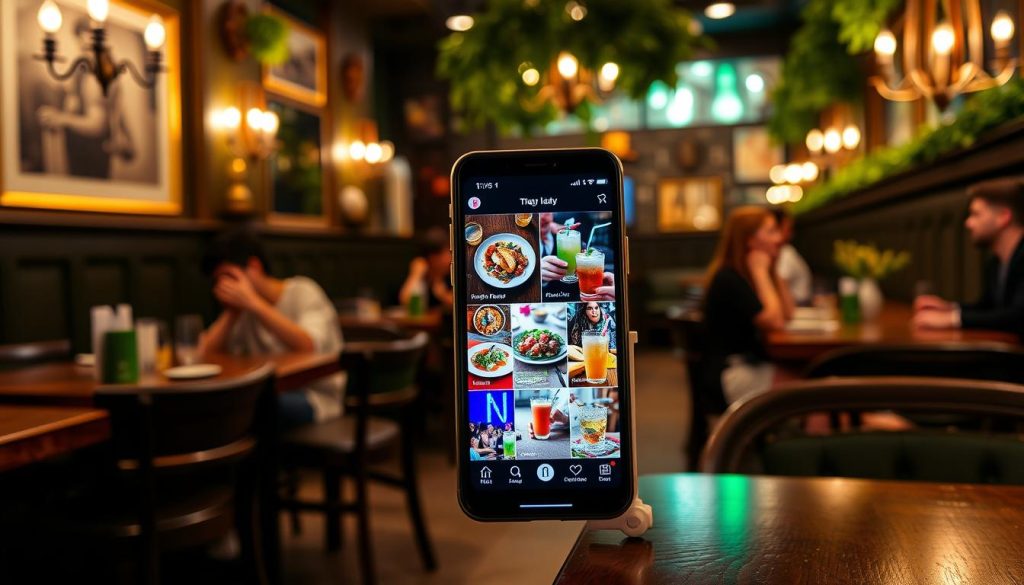
Good restaurant marketing is key to getting more people to know about you. Using modern tech, like social media, helps reach more people. This part talks about how social media and other online methods can help your restaurant stand out and keep customers coming back.
Utilising Social Media Platforms
Social media is a great way to promote your restaurant. Sites like Instagram, Facebook, and Twitter are perfect for connecting with people. Here are some ideas:
- Post pictures of your food to make people want to try it.
- Run contests and giveaways to get more people involved.
- Use photos and reviews from customers to show your restaurant’s community spirit.
- Use ads to target specific groups of people.
Looking at successful Irish restaurants can give you ideas. They’ve used social media well to grow their business. A good online marketing plan can really help your restaurant get noticed and attract more visitors.
Engaging with the Local Community
Getting involved in your local community is important for building loyalty and a good reputation. Here are some ways to do it:
- Host special events or themed nights to draw in locals.
- Join in local festivals to get your name out there.
- Work with other local businesses to promote each other, showing off your hospitality.
- Start a loyalty program to thank your regular customers.
These efforts can really help your restaurant become a beloved part of the community. It will attract more people who want to come back.
Understanding Health and Safety Regulations
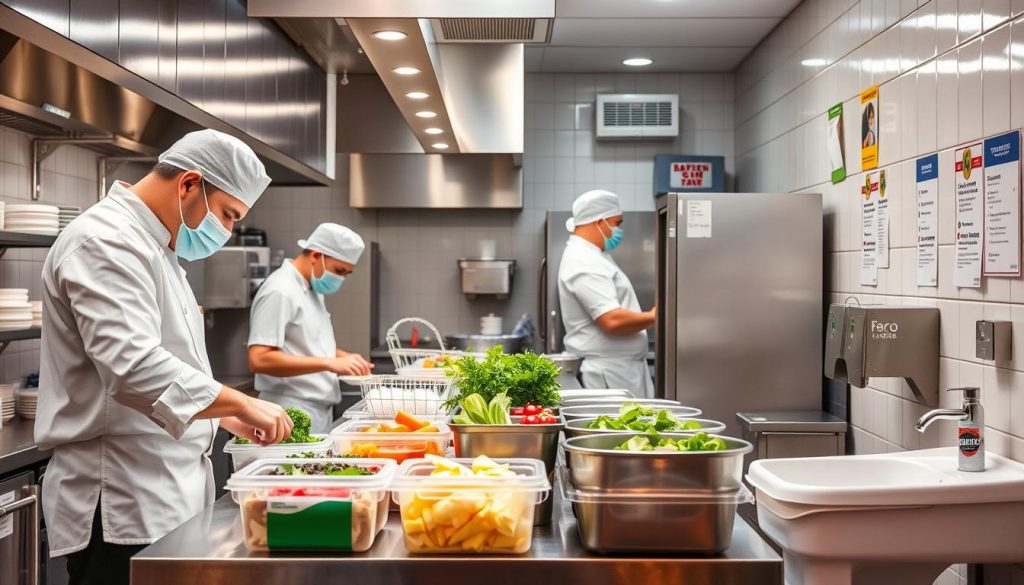
Following health and safety rules is key for any restaurant’s success. In Ireland, there are strict rules for restaurants to keep everyone safe. It’s important for owners and managers to know these rules well.
Good hygiene is at the heart of health and safety in restaurants. This includes how food is handled, stored, and prepared. It’s vital to train staff on keeping things clean. They should know to wash hands often and wear protective gear when needed.
Health authorities regularly check restaurants to make sure they follow the rules. These checks help keep hygiene standards high and avoid fines. It’s crucial for restaurants to have clear rules and records in place.
Creating a safe work environment is important. Hold regular meetings to talk about cleanliness, offer ongoing training, and encourage staff to speak up about safety issues. This not only keeps everyone safe but also builds trust with customers.
Implementing a Reservation System
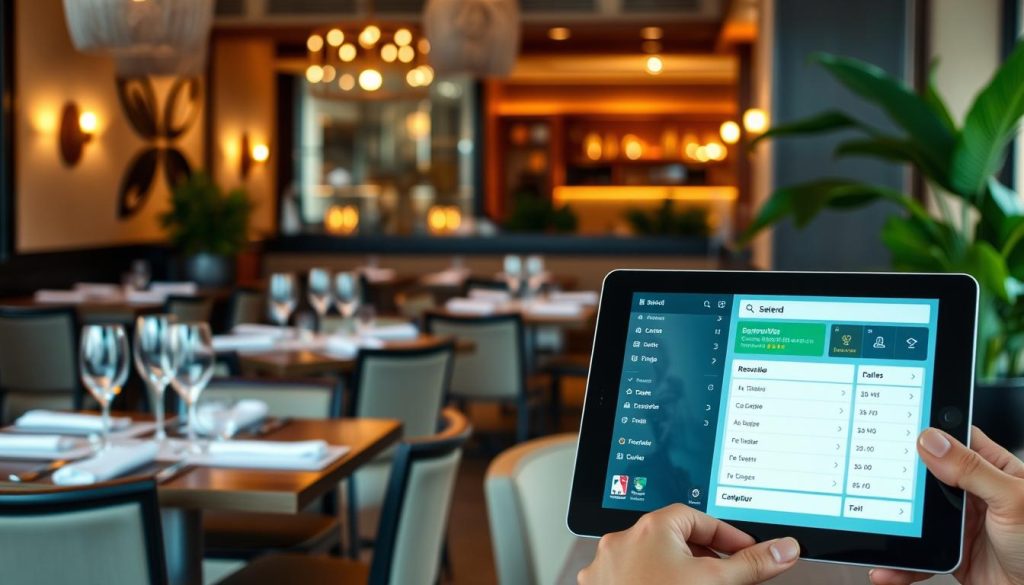
Setting up a good restaurant reservation system can make things better for both customers and the business. It helps manage bookings well, cutting down on the hassle of walk-ins and overbooking.
There are two main ways to book a table: online or by phone. Online systems are handy because they let customers book anytime. Many software solutions work with the restaurant’s website, keeping everything up to date.
For better booking management, look for tools with these features:
- Customer preference tracking for personalised service.
- No-show management to minimise the impact on revenue.
- Reminder notifications to customers to reduce absentee rates.
- Integration with existing Point of Sale systems for smooth operations.
Choosing the right reservation system is key. It boosts customer happiness and makes things run smoother inside the restaurant. This leads to better business results overall.
Establishing Supplier Relationships
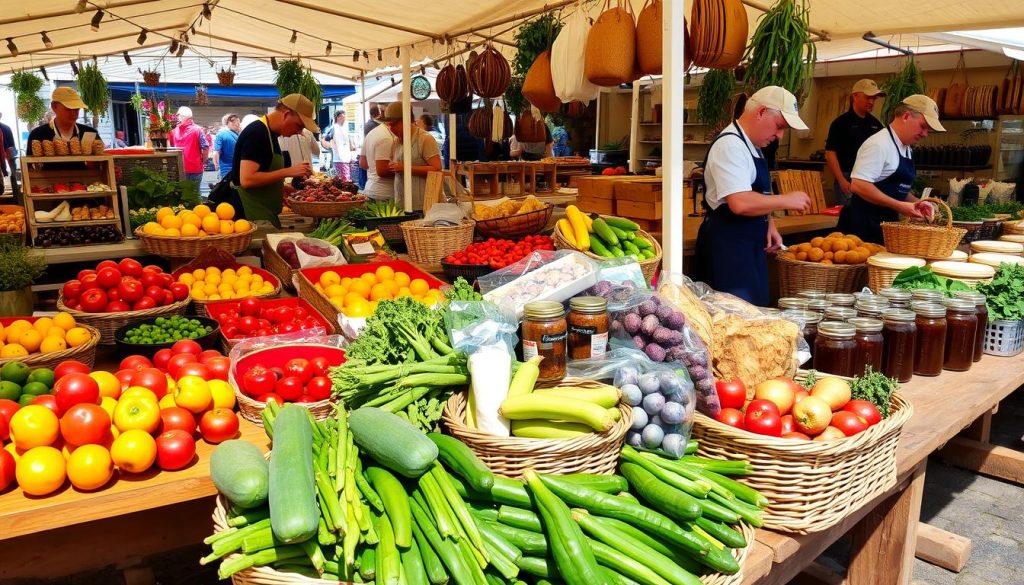
Building strong relationships with restaurant suppliers is key. It helps get quality ingredients and sets up an efficient supply chain. In the competitive world of hospitality, finding good suppliers is crucial for great dining experiences. Look for suppliers who focus on quality control to get consistent and top-notch ingredients.
Finding Quality Ingredients
When looking for ingredients, consider these points:
- Reputation of suppliers in the market.
- Certifications or standards that show quality assurance.
- Availability of seasonal and local ingredients.
- Commitment to sustainable practices, which can boost your brand image.
Working with different suppliers can give you more choices and better quality and prices. Building these relationships on shared goals helps build trust and teamwork. This benefits your restaurant’s success.
Negotiating Contracts
Supplier contracts are very important. They set the stage for lasting agreements. Good negotiations in hospitality need a clear understanding of both sides’ needs and worries. Focus on these key points during talks:
- Make sure terms are good for both, aiming for mutual benefits.
- Keep things clear about pricing and what’s expected.
- Include flexibility for changes in demand or services.
- Set up a system for quality control in restaurants that ensures consistency and responsibility.
By focusing on mutual growth and open talks, restaurants can build stronger partnerships with suppliers. This can improve their food offerings.
Preparing for Your Grand Opening

The restaurant grand opening is a big deal. It needs careful planning to get people excited and bring in customers. Here are some tips to build anticipation:
- Have a soft opening before the big day to fix any issues and get feedback from guests.
- Get local press and food bloggers to cover your event. Their reviews can really help.
- Invite local groups or charities to join in. It’s good for your image and can reach more people.
- Use social media to promote your opening. Share behind-the-scenes stuff, sneak peeks, and countdowns to create excitement.
Good strategies for your opening day are crucial for success. Offer special deals or unique dishes to draw people in. Also, a fun event with entertainment can make it a memorable day for everyone.
Managing Finances Post-Launch
After your restaurant opens, managing money well is key to growing. A good budget helps you keep track of spending and use money smartly. Starting to track finances early lets you see patterns, find problems, and change plans as needed.
Using special tools for tracking money makes it easier to watch expenses and income. QuickBooks or Xero can help with keeping accurate records. This way, you understand your cash flow better, which is vital for knowing your financial health.
Also, checking your finances often and comparing them to your plans helps improve your strategies. This close look at your money not only boosts profits but also gets you ready for future ups and downs. Being active in managing money lets you make choices that help your restaurant succeed in the long run.

